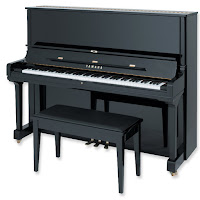 Other than aesthetics, a grand piano is
larger and generally a nicer piece of furniture, there are two other very
important differences: Touch and Tone.
Other than aesthetics, a grand piano is
larger and generally a nicer piece of furniture, there are two other very
important differences: Touch and Tone.
Touch for a performer is the most
important. Both beginners and professionals will appreciate a good touch. In a grand piano, our old friend gravity is
taken full advantage of to “reload” the note for the next strike. This allows for a much simpler mechanism,
which translates to a more direct connection between the player’s finger and
the sound produced. The mechanism,
called the action, is very different between a grand and an upright. In an
upright piano, there are extra springs, levers and cotton straps as well as
silk cords used to help a hammer “reload”.
This more complicated action results in a less direct connection between
the fingertip and the resultant sound.
It is also much easier to control the dampers of a grand piano as once
again, you are working against gravity.
In an upright piano, the dampers are held in place against the strings
by means of a spring. While gravity’s
strength can be relied on to be consistent, springs can differ in strength from
one to another or as they age.
The Tone of a grand piano will always be
better than that of an upright piano, all other things being equal. The reason for this is that there are zero
obstructions between your ear and BOTH sides of the vibrating soundboard. In an
upright piano, the soundboard is located at the back of the piano, so the sound
bounces between the soundboard and the wall the piano is placed against. In the front, the sound bounces around inside
the piano cavity (between the soundboard and the lower kick board). This produces a more muffled or less live
sound than what is produced from a grand piano soundboard.
To sum up: a grand piano will offer more
control of the music as well as a richer palette of sounds (or tones) to use.
By Carmen Papalia and Andy Adams RPT
Owner of the Family business Ottawa Pianos

This comment has been removed by the author.
ReplyDelete